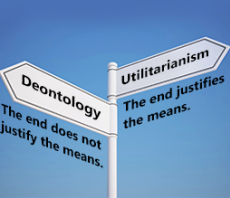
Email: lienaaltai@icloud.com
Total Article : 47
About Me:Sixth form student with an interest in a wide variety of topics such as languages, history, philosophy, politics and literature

The second maxim is the formula of humanity. Kant explains this by saying, “act in such a way as… the person… [is] never simply as means, but always at the same time as an end”. This shows us that in order for an action to be morally good, one must never treat a human as an instrument, but with the full respect that they deserve e.g torturing someone for information. Kant states that this is a universal self-evidence principle. One who observes themselves as rational and a free-agent will move to see others as the same. Montague Brown agrees as he says, “the second version provides a solid basis for moral obligation”.
The third and last maxim is the kingdom of ends in which Kant states that, “a rational being must always regard himself as making laws in a kingdom of ends which is possible through freedom of the will”. This maxim emphasises that humans are not alone and that through reason they can create a society e.g stealing is wrong therefore it is always illegal.
Although Kant rejects happiness as a primary goal in ethical decision making, it still plays a role in his ethical theory. Kant says that, “pure practical reason requires not that we should denounce the claims of happiness; it requires only that we take no account of them whenever duty is in question”. The Sunnum Bonum (highest good), consists of the two parts of virtue and happiness. Virtue is connected to good will and is the required condition for anything to be good or desirable. However, for the “entire and perfect good… happiness is also required”. Humans should be happy to the degree that they deserve to be happy. “The highest created good is the most perfect world, that is a world in which rational beings are happy and worthy of happiness”.
Philosopher W.D Ross adds to Deontology by saying that acting out of motivation is incoherent as we cannot choose why we act, only how we will act. Ross claims that our prima facie duties affect how we act. These are duties to repay acts of generosity or to help those dependent on us. One will only know what the relevant prima facie duty will be once in the situation. If two prima facie duties conflict then one must decide which is more important in a particular situation. Therefore, Ross argues that Kantian duties must not be taken as absolute duties but instead prima facie duties. The six prima facie duties listed include our duties of fidelity and reparation, gratitude, justice, beneficence, self improvement and nonmalificence.
Overall, the key features of Deontology include partaking in moral acts that value the respect in each human individual through recognising that it is out duty to do so.
http://www.buzzle.com/articles/how-is-deontology-different-from-utilitarianism.html

0 Comment:
Be the first one to comment on this article.